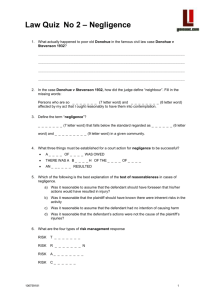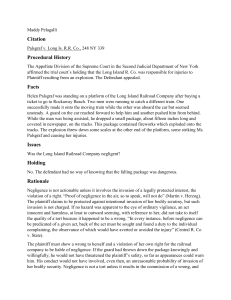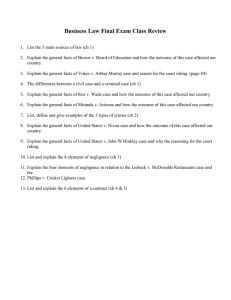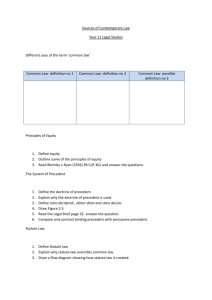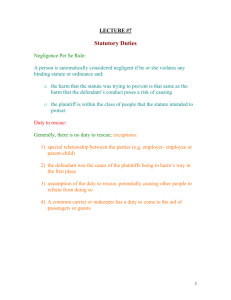Negligence Per Se Negligence claims are based on the common
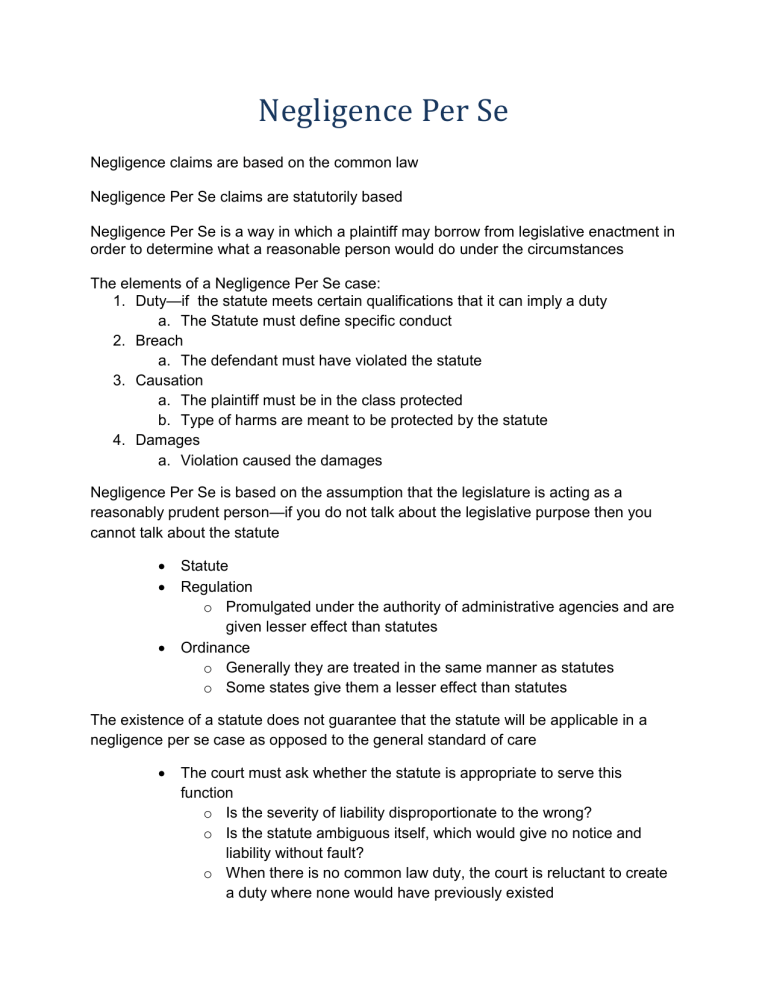
Negligence Per Se
Negligence claims are based on the common law
Negligence Per Se claims are statutorily based
Negligence Per Se is a way in which a plaintiff may borrow from legislative enactment in order to determine what a reasonable person would do under the circumstances
The elements of a Negligence Per Se case:
1. Duty —if the statute meets certain qualifications that it can imply a duty a. The Statute must define specific conduct
2. Breach a. The defendant must have violated the statute
3. Causation a. The plaintiff must be in the class protected b. Type of harms are meant to be protected by the statute
4. Damages a. Violation caused the damages
Negligence Per Se is based on the assumption that the legislature is acting as a reasonably prudent person —if you do not talk about the legislative purpose then you cannot talk about the statute
Statute
Regulation o Promulgated under the authority of administrative agencies and are given lesser effect than statutes
Ordinance o Generally they are treated in the same manner as statutes o Some states give them a lesser effect than statutes
The existence of a statute does not guarantee that the statute will be applicable in a negligence per se case as opposed to the general standard of care
The court must ask whether the statute is appropriate to serve this function o Is the severity of liability disproportionate to the wrong? o Is the statute ambiguous itself, which would give no notice and liability without fault? o When there is no common law duty, the court is reluctant to create a duty where none would have previously existed
When the plaintiff is not permitted to use the statute to prove a standard of care the plaintiff’s case defaults to the reasonable standard of care o They must prove that the defendant failed to act as a reasonable person would o The fact that the statute is inapplicable because it does not meet the requirements for negligence per se does not necessarily rule it out entirely as evidence bearing on the issue of negligence
Most courts have refused to use licensing statutes to establish a standard of care o Violation of statute does not establish negligent conduct because the violation does not cause the harm
Ex: Driving a car without a valid license or a suspended license (does not cause the driver to drive recklessly)
Ex: Hunting without a license (Does not cause harm to other hunters by accidently shooting one of them)
3 possible legal effects of negligence per se (regardless of the legal effect it is still called negligence per se):
1. Negligence Per Se —conclusive as a matter of law if plaintiff establishes these things then they win (unexcused violation) a. There could be an excuse so it is not conclusive b. Must show an excuse other than saying that they were acting prudently
2. Rebuttable Presumption —if you establish fact A then the law will presume that B is true a. If plaintiff establishes requirement of the statute then there is a presumption that defendant was negligent i. If defendant does not say anything they are guilty
1. This puts the burden of proof on the defendant a. Must show that they had a reasonable excuse
3. Evidence a. person was reasonable in what they did b. It was a common practice
Hypo: Susie lives on waterfront property within her South
Florida community. She believes that she has a pet alligator and feeds it every morning. The alligator is now conditioned to Susie's feeding schedule. One day Susie gets ill and does not come out to feed the alligator.
The alligator is hungry and eats Bobby, who was a 8 year old boy who was fishing by the shore of the lake in the area where Susie usually feeds her "pet alligator". Bobby's parents want to sue
Susie, do they have a claim based on negligence per se (based off of the statute to the left)?
Bobby's parents will try to establish a
“negligence per se” claim:
Duty: The specific conduct defined within the statute is feeding or enticing an alligator
Breach: Susie violated the statute by both feeding and enticing the alligator
Causation: Bobby does not fall under the class of people the statute was meant to protect. This can be determined by reviewing the statute and the title that it falls under which is "Wildlife Preservation". So the statute is meant to protect the alligators.
Further, these are not the type of harms which the statute was meant to prevent because the harms meant to be prevented are those that would harm the alligators, not the people around them.
Damages: The violation of this statute caused Bobby's death.
While Bobby's parents cannot file a claim based on negligence per se they can file a claim based on common law negligence.
